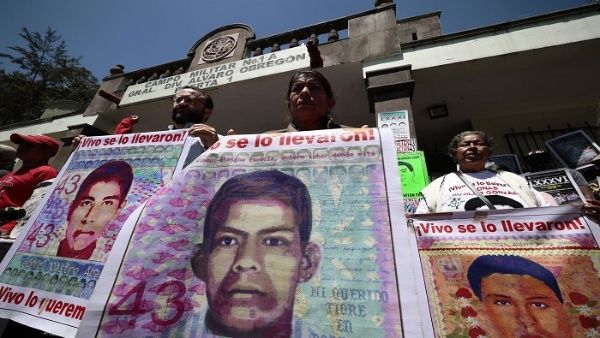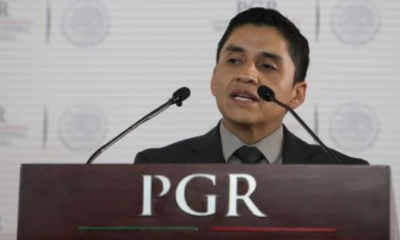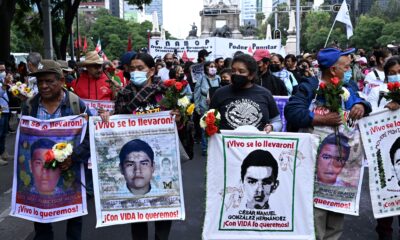International
Military espionage uncovered in Ayotzinapa normalistas case

October 19 |
The Commission for Truth and Access to Justice in the Ayotzinapa Case (CoVAJ) released on Wednesday a series of documents showing that the Mexican Army possessed information on the possible whereabouts of the missing normalista students in Ayotzinapa, Mexican state of Guerrero.
The mechanism created to support the clarification of the disappearance of 43 students between September 26 and 27, 2014, revealed at least 18 declassified documents derived from the monitoring carried out on criminal actors in the region, such as the Guerreros Unidos, linked to the disappearance of the young people.
Several of these texts reveal the transfer of a group of 17 students from Iguala to the city of Chilpancingo, some 100 kilometers away, and that they were allegedly held in a cave, but it is not known if this has been included in the investigations or if the families have been informed.
According to the report, the Army “had knowledge of what was happening (…) That is to say, they had information in real time about the possible destinations of the missing students, as well as the people involved, their relationship with ministerial authorities and places where they were possibly sheltered.”
For its part, Mexico’s Interior Ministry stated in a press release that these files presented were already known to the investigation teams, such as the Interdisciplinary Group of Independent Experts (GIEI), but have now been published in full.
However, this report hints that the Army may have much more information about the case of the missing Ayotzinapa normalistas, but that it has not been handed over to the victims’ families and investigators despite numerous requests.
One of the proofs of this is that the documents were numbered consecutively. Thus, it can be concluded that between the documents ‘CRFI 1202’, ‘CRFI 1203’ and ‘CRFI 1204’, referring to communications tapped on September 27, 2014 and the following ‘CRFI 1212’, from the other day, a skip can be described in which papers are missing.
International
U.S. Senate Rejects Budget, Bringing Government Closer to Shutdown Amid DHS Dispute

The U.S. Senate voted on Thursday against a budget proposal in a move aimed at pressuring changes at the Department of Homeland Security (DHS), following the killing of two civilians during a deployment of immigration agents in Minneapolis.
All Senate Democrats and seven Republican lawmakers voted against the bill, which requires 60 votes to advance, pushing the country closer to a partial government shutdown that would cut funding for several agencies, including the Pentagon and the Department of Health.
The rejection came as Senate leaders and the White House continue negotiations on a separate funding package for DHS that would allow reforms to the agency. Proposed measures include banning Immigration and Customs Enforcement (ICE) agents from wearing face coverings and requiring them to use body-worn cameras during operations.
The vote took place just hours after President Donald Trump said he was “close” to reaching an agreement with Democrats and did not believe the federal government would face another shutdown, following last year’s record stoppage.
“I don’t think the Democrats want a shutdown either, so we’ll work in a bipartisan way to avoid it. Hopefully, there will be no government shutdown. We’re working on that right now,” Trump said during a Cabinet meeting at the White House.
International
Trump Says Putin Agreed to One-Week Halt in Attacks on Ukraine Amid Extreme Cold

U.S. President Donald Trump said on Thursday that he secured a commitment from Russian President Vladimir Putinto halt attacks against Ukraine for one week, citing extreme weather conditions affecting the region.
“Because of the extreme cold (…) I personally asked Putin not to attack Kyiv or other cities and towns for a week. And he agreed. He was very pleasant,” Trump said during a Cabinet meeting broadcast by the White House.
Trump acknowledged that several advisers had questioned the decision to make the call.
“A lot of people told me not to waste the call because they wouldn’t agree. And he accepted. And we’re very happy they did, because they don’t need missiles hitting their towns and cities,” the president said.
According to Trump, Ukrainian authorities reacted with surprise to the announcement but welcomed the possibility of a temporary ceasefire.
“It’s extraordinarily cold, record cold (…) They say they’ve never experienced cold like this,” he added.
Ukrainian President Volodymyr Zelensky later commented on the announcement, expressing hope that the agreement would be honored.
International
Storm Kristin Kills Five in Portugal, Leaves Nearly 500,000 Without Power

Storm Kristin, which battered Portugal with heavy rain and strong winds early Wednesday, has left at least five people dead, while nearly half a million residents remained without electricity as of Thursday, according to updated figures from authorities.
The revised death toll was confirmed to AFP by a spokesperson for the National Emergency and Civil Protection Authority (ANPEC). On Wednesday, the agency had reported four fatalities.
Meanwhile, E-Redes, the country’s electricity distribution network operator, said that around 450,000 customers were still without power, particularly in central Portugal.
Emergency services responded to approximately 1,500 incidents between midnight and 8:00 a.m. local time on Wednesday, as the storm caused widespread disruptions.
The Portuguese government described Kristin as an “extreme weather event” that inflicted significant damage across several regions of the country. At the height of the storm, as many as 850,000 households and institutions lost electricity during the early hours of Wednesday.
Several municipalities ordered the closure of schools, many of which remained shut on Thursday due to ongoing adverse conditions.
Ricardo Costa, regional deputy commander of the Leiria Fire Brigade, said residents continue to seek assistance as rainfall persists.
“Even though the rain is not extremely intense, it is causing extensive damage to homes,” he noted.
In Figueira da Foz, a coastal city in central Portugal, strong winds toppled a giant Ferris wheel, underscoring the severity of the storm.
-

 Central America4 days ago
Central America4 days agoGuatemala Police Arrest Prison Guard Caught in the Act of Extortion
-

 Central America4 days ago
Central America4 days agoHonduras swears in conservative president Asfura after disputed election
-

 Central America4 days ago
Central America4 days agoBukele leads public trust rankings as UCA survey highlights gains in security
-

 International3 days ago
International3 days agoFootball Fan Killed in Clashes After Colombian League Match
-

 International4 days ago
International4 days agoDoomsday clock moves to 85 seconds before midnight amid rising global risks
-

 Central America3 days ago
Central America3 days agoGuatemala President Says Starlink Terminal Found Inside Prison
-

 International2 days ago
International2 days agoU.S. Senate Rejects Budget, Bringing Government Closer to Shutdown Amid DHS Dispute
-

 International4 days ago
International4 days agoWinter Storm Fern Leaves 30 Dead and Over One Million Without Power Across the U.S.
-

 Sin categoría4 days ago
Sin categoría4 days agoEight Killed in Series of Armed Attacks in Ecuador’s Manabí Province
-

 International4 days ago
International4 days agoSpain approves plan to regularize up to 500,000 migrants in Historic Shift
-

 International3 days ago
International3 days agoMissing Spanish Sailor Rescued After 11 Days Adrift in Mediterranean
-

 International3 days ago
International3 days agoRubio Says U.S. Could Participate in Follow-Up Russia-Ukraine Talks
-

 Sin categoría4 days ago
Sin categoría4 days agoEl Salvador Launches Fourth Year of Ocean Mission to Protect Marine Ecosystems
-

 Central America24 hours ago
Central America24 hours agoPanama Supreme Court Strikes Down Panama Ports Concession as Unconstitutional
-

 International2 days ago
International2 days agoStorm Kristin Kills Five in Portugal, Leaves Nearly 500,000 Without Power
-

 Central America24 hours ago
Central America24 hours agoU.S. and Guatemala Sign Trade Deal Granting Zero Tariffs to Most Exports
-

 International2 days ago
International2 days agoMan Arrested After Vehicle Crashes Into Jewish Institution in Brooklyn
-

 International2 days ago
International2 days agoTrump Says Putin Agreed to One-Week Halt in Attacks on Ukraine Amid Extreme Cold
































